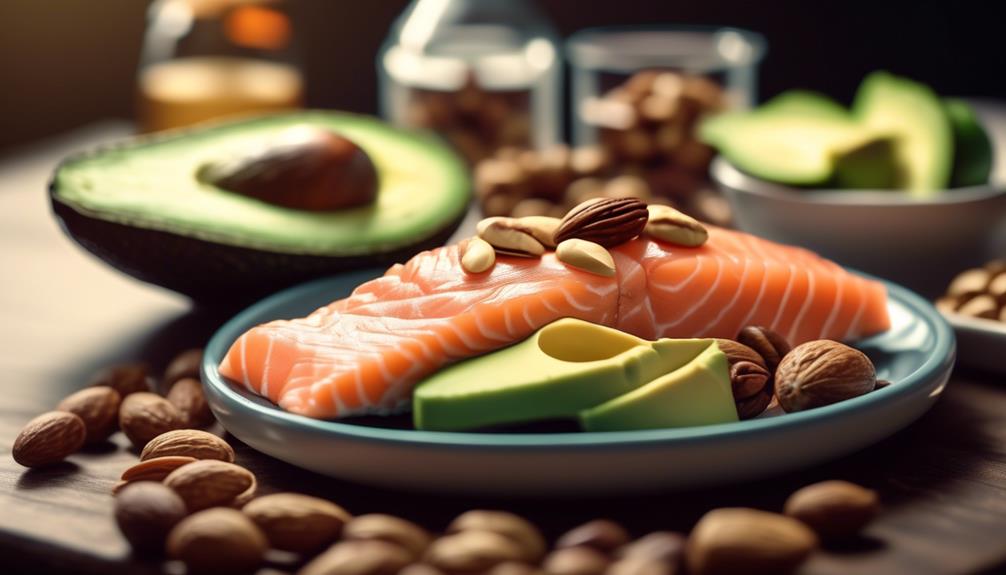As you lace up your running shoes and head out for your daily jog, you can't help but wonder if there is a way to maximize your athletic endurance. Coincidentally, there is a method that has been gaining popularity among athletes – the keto diet.
By adopting a diet high in healthy fats, moderate in protein, and low in carbohydrates, you may be able to unlock a new level of endurance. But how exactly does this diet work, and what are the benefits it can provide for your athletic performance?
Get ready to discover the secrets behind maximizing your endurance with the keto diet, and prepare to redefine your limits.
Understanding the Keto Diet Basics

What are the basic principles of the Keto Diet?
Understanding ketosis is crucial to grasping the foundation of the Keto Diet. Ketosis is a metabolic state in which your body uses fat as its primary fuel source instead of carbohydrates. By drastically reducing your carbohydrate intake and increasing your fat consumption, you can shift your body into ketosis.
This dietary approach has gained popularity among athletes due to its potential benefits for performance and endurance.
One of the main benefits of the keto diet for athletes is the enhanced ability to tap into fat stores for energy. When in ketosis, your body becomes efficient at using stored fat as fuel, which can potentially prolong endurance during exercise. Additionally, the keto diet may lead to reduced inflammation and improved recovery, allowing athletes to bounce back quicker from intense training sessions.
However, it's important to note that the transition to a keto diet can be challenging, as your body needs time to adapt to using fat as its primary energy source. This adjustment period, often called the 'keto flu,' can cause symptoms like fatigue, headaches, and irritability. Adequate hydration and electrolyte intake are crucial during this phase to mitigate these effects.
How the Keto Diet Enhances Fat Burning
The keto diet enhances fat burning by increasing fat metabolism and enhancing energy utilization.
When you follow a keto diet, your body enters a state of ketosis, where it relies on fat for fuel instead of carbohydrates.
This metabolic shift allows for efficient fat breakdown and utilization, leading to enhanced fat burning and improved athletic endurance.
Increased Fat Metabolism
To enhance fat burning, the Keto Diet increases fat metabolism through a specific dietary approach. Here are four ways the Keto Diet promotes increased fat metabolism:
- Reducing carbohydrate intake: By severely restricting carbohydrates, the body is forced to rely on fat as its primary fuel source, leading to increased fat metabolism.
- Promoting ketosis: The Keto Diet triggers the production of ketones, which are molecules produced when fat is broken down. These ketones are then used as fuel, further enhancing fat metabolism.
- Enhancing mitochondrial function: Mitochondria are the powerhouses of our cells, responsible for converting fuel into energy. The Keto Diet improves mitochondrial function, allowing for more efficient fat metabolism.
- Increasing fat oxidation: The Keto Diet increases the body's ability to oxidize or burn fat, leading to improved performance and increased stamina.
Enhanced Energy Utilization
To optimize fat metabolism, the Keto Diet enhances energy utilization, allowing your body to efficiently burn fat for fuel. This is achieved through a process called fat adaptation, which occurs when your body becomes more efficient at using fat as its primary source of energy.
When following a ketogenic diet, your carbohydrate intake is restricted, forcing your body to rely on fat for fuel. As a result, your body becomes better at utilizing fat and ketones for energy production. This enhanced energy utilization has several performance benefits for athletes.
Boosting Endurance Through Ketosis

To boost endurance through ketosis, you need to understand how the keto diet provides energy from fat, enhances fat burning, and reduces glycogen depletion.
When you're in a state of ketosis, your body relies on fat as its primary fuel source, allowing you to tap into your body's abundant fat stores and sustain energy for longer periods.
This shift in fuel utilization can increase endurance by preserving glycogen stores, which are typically depleted during high-intensity exercise.
Energy From Fat
Boost your endurance and enhance athletic performance by tapping into the power of fat for energy with the ketogenic diet. When you follow a keto diet, your body undergoes a process called fat adaptation, where it becomes efficient at using fat as its primary fuel source. This metabolic efficiency is beneficial for endurance athletes in several ways:
- Increased fat oxidation: By training your body to rely on fat for fuel, you can tap into a virtually unlimited energy source, as the body stores more fat compared to carbohydrates.
- Improved glycogen sparing: By sparing glycogen, your body can preserve its limited carbohydrate stores for intense bursts of activity, allowing you to sustain energy levels over prolonged periods.
- Enhanced endurance performance: A fat-adapted metabolism can provide a more steady and sustained energy supply, reducing the risk of hitting the dreaded 'wall' during long-duration activities.
- Reduced reliance on refueling: With increased fat utilization, you may experience less need for frequent refueling during exercise, leading to improved convenience and potentially reducing the risk of gastrointestinal discomfort.
Enhanced Fat Burning
By adopting a ketogenic diet, you can optimize your endurance and boost performance by enhancing your body's ability to burn fat for fuel. When you follow a keto diet, your body enters a state of ketosis, where it relies on fat as its primary source of energy instead of carbohydrates.
This shift in fuel source has several benefits for athletes. Firstly, fat is a more efficient source of energy, providing a sustained and steady supply throughout your workouts. This means you can maintain your performance for longer periods without experiencing energy crashes.
Secondly, relying on fat for fuel allows you to tap into your body's vast stores of stored fat, leading to improved fat burning and potentially aiding in weight loss.
Reducing Glycogen Depletion
Enhancing your endurance through ketosis involves reducing glycogen depletion. By following a ketogenic diet and reducing carbohydrate intake, you can optimize your body's ability to spare glycogen and rely on fat for fuel. Here are four ways to achieve glycogen sparing and boost your endurance:
- Carbohydrate restriction: By limiting your carbohydrate intake, you force your body to use alternative fuel sources, such as fat. This helps preserve glycogen stores for longer periods of exercise.
- Increased fat utilization: Ketosis promotes the utilization of fat as the primary energy source. This allows you to tap into your body's abundant fat stores and spare glycogen.
- Improved metabolic flexibility: By adapting to a low-carb, high-fat diet, your body becomes more efficient at switching between fuel sources. This flexibility enhances your endurance and reduces glycogen depletion during prolonged exercise.
- Enhanced endurance performance: Studies have shown that athletes who follow a ketogenic diet experience improvements in endurance performance. This is likely due to the increased reliance on fat for fuel and reduced glycogen depletion.
Incorporating these strategies into your training and nutrition plan can help you maximize athletic endurance through ketosis. By reducing glycogen depletion and optimizing fat utilization, you can enhance your performance and achieve your endurance goals.
Optimizing Macronutrient Ratios for Athletic Performance

To optimize your athletic performance, it's crucial to carefully consider and adjust your macronutrient ratios. The macronutrients – carbohydrates, fats, and proteins – play a vital role in fueling your body during exercise and aiding in muscle recovery.
When it comes to weight loss, adjusting macronutrient ratios can be beneficial. The keto diet, which is low in carbohydrates and high in fats, has gained popularity for its weight loss benefits. By reducing carbohydrate intake and increasing fat consumption, the body enters a state of ketosis, where it burns fat for fuel instead of carbohydrates. This can lead to weight loss and improved body composition.
However, if your goal is to gain muscle, the keto diet may not be the best choice. Carbohydrates are the body's preferred source of energy during high-intensity exercise, and a lack of carbohydrates can limit your performance and hinder muscle growth. In this case, adjusting macronutrient ratios to include a higher carbohydrate intake may be more beneficial. Carbohydrates provide the necessary fuel for intense workouts and aid in muscle recovery by replenishing glycogen stores.
Fueling Workouts With Keto-Friendly Foods
Fuel your workouts with a variety of delicious keto-friendly foods. Maintaining muscle mass on the keto diet is important, so make sure to choose pre-workout snacks that provide the necessary nutrients. Here are four keto-friendly options to fuel your workouts:
- Hard-boiled eggs: Eggs are a great source of protein and healthy fats. They provide essential amino acids that help in muscle repair and growth. Plus, they're quick and easy to prepare.
- Avocado: Rich in healthy fats and fiber, avocados provide sustained energy during workouts. They also contain potassium, which helps prevent muscle cramps. Enjoy them sliced on their own or in a delicious keto-friendly smoothie.
- Nuts and seeds: Almonds, walnuts, and chia seeds are excellent sources of healthy fats and protein. They provide a quick energy boost and help keep you feeling satiated throughout your workout.
- Greek yogurt: Opt for full-fat Greek yogurt, as it's low in carbs and high in protein. It also contains essential amino acids and probiotics, which support muscle recovery and gut health.
Incorporating Proper Hydration for Athletic Endurance

To optimize your athletic endurance on the keto diet, it's essential to prioritize proper hydration throughout your workouts. Proper hydration techniques play a crucial role in maintaining optimal performance and preventing dehydration-related issues.
When following the keto diet, your body is in a state of ketosis, where it relies on fat for fuel instead of carbohydrates. This shift can affect your body's water balance, making it even more important to stay adequately hydrated.
To ensure proper hydration, start by drinking water before, during, and after your workouts. Aim to consume at least 8-12 ounces of water every 15-20 minutes during exercise. It's also essential to replenish electrolytes lost through sweat. Electrolytes such as sodium, potassium, and magnesium help maintain fluid balance and support muscle function.
Consider incorporating electrolyte-rich beverages or adding electrolyte supplements to your routine. These can provide the necessary minerals to keep your body properly hydrated and prevent muscle cramps or fatigue.
Conclusion
So, if you're looking to maximize your athletic endurance, the keto diet could be the game-changer you've been searching for.
By understanding the basics of this low-carb, high-fat diet, you can enhance your body's fat-burning abilities and boost your endurance through ketosis.
By optimizing your macronutrient ratios and fueling your workouts with keto-friendly foods, you'll be on your way to reaching peak performance.
Don't forget to stay properly hydrated for optimal athletic endurance.
So, kickstart your journey to better endurance with the keto diet today!







